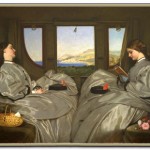During a bout of channel hopping, my daughters and I started to watch James Bond Die Another Day. NSA agent Jinx (Halle Berry) shot a baddie in a gene therapy clinic and then chased and shot at another one who escaped in a helicopter. She then dived off a cliff into the sea below and swam to her waiting speedboat. The next scene switched to Bond, but my girls weren’t interested, they wanted me to rewind live TV so that we could just watch Jinx.
It is the same when they play Lego Lord of the Rings and Lego Star Wars on our PS3. They always choose open world mode so that they can make up their own stories and play with just the female characters.
I was desperate to see women taking centre stage when I was a girl too. I just didn’t have the technology to do anything about it. Everything seemed to be all about men and this is because many stories were and still are based on the hero’s quest or monomyth identified by Joseph Campbell who said that women’s stories are to be found in fairytales.
Fairytales are more women-centred, but they are not the female equivalent of the hero’s quest. They are a historical reflection of women in society. For a long time, women didn’t have rights, possessions, or power. They needed to marry and have children in order to survive in the world of men.
So far, my girls know fairytales because of Disney, which are jollier than the Brothers Grimm. Tangled‘s Rapunzel going off to see the floating lanterns is much nicer than the Rapunzel who gets swapped for a lettuce. Even so both stories are about the girl in a tower who gets rescued and married.
My girls play at getting married a lot and I wonder if their exposure to fairytales will limit their expectations and aspirations when it comes to their own lives as stories have power. So, I was satisfied when my eldest said she was playing at the Princess getting her PhD and then getting married – even if she did wink when she said it.
We tell ourselves stories all the time and shape our lives that way. So, when my girls are playing video games I like to think they are moving women centre stage.
Over on fangirl blog there is a blog series about rewriting the monomyth and what a feminine parallel to the hero’s quest would look like. Campbell looked backwards for his model. So looking forwards would be a way to create a strong female stories which reflect feminine concerns and ambitions.
Historical novelist, Philippa Gregory has found a way of looking backwards to find strong female stories as she shifts women into the centre of the history we already know. She describes her approach in the back of Lady of the Rivers, part of her War of the Roses (or Cousin’s war) series. Gregory says that she has spent her life as an historian of women, their place in society and their struggle for power, especially that large proportion of women whose lives have been ignored by historians in favour of the lives of prominent men.
And that was what was so brilliant about the BBC 1’s historical dramatic adaptation of Gregory’s books. They intertwined three of her books about women to make The White Queen. It was the history that we know and love but with women in the centre. My girls enjoyed watching, more than once, the coronation of Elizabeth of York, aka the White Queen.
And, the BBC’s did a fabulous job of educating and immersing the viewer in that historical period . On their website you could find out more about childbirth and child care at that time to see if Margaret and Elizabeth enduring lots of time away from their children was common or just a plot ruse. You could watch again your favourite bits on the tumblr white queen site as they tried to exercise some influence over their lives by plotting and spying or with witchcraft and prayer.
And yet in the Guardian this week, there was a review of the latest films and books about witches and witchcraft stories for teenage girls. The article quotes YA writer Ruth Warburton saying that witch stories are timeless because there is a desire to see girls in less passive roles.
Great! But where are the stories of young females using their nous instead of their supernatural powers? I can only think of The Hunger Games in the hero’s quest mould which no doubt my girls will enjoying playing, reading, watching when they are older, even though it is not that jolly to be going off to fight to the death.
Or, perhaps we don’t need a female version of a hero’s battling quest. Already, my girls are using technology to design female versions of the stories they like in order to please themselves, which include a lot less fighting and more cape swishing and having a nice time. This appeals to me no end and I can’t wait to see what they do next.




